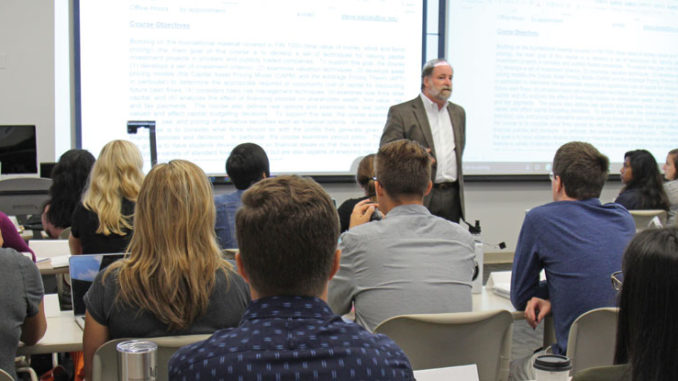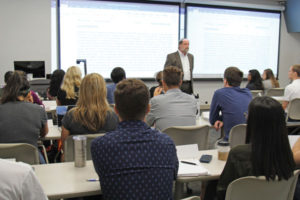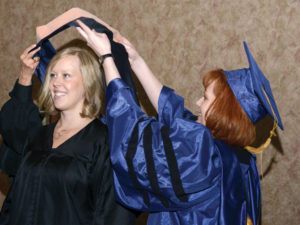
By Mike Boyer
A year ago, Jay Hall, who lives in the Cincinnati suburb of Bridgetown,

launched a new construction business and the pursuit of a Masters of Business Administration degree from Mount St. Joseph University.
Hall, 36, admits it is unusual for the proprietor of a one-person construction firm to be seeking an MBA, but he says he hopes it sets him apart.
During the 2008 recession, Hall, like a lot of people in a tight job market, went back to school to earn an associate’s degree in civil engineering technology from Cincinnati State Technical & Community College and then a bachelor’s degree in business from Mount St. Joseph.
“I know that’s not the only economic downturn I’ll see in my working lifetime,” he says. “My way to differentiate myself is I’ll have a master’s degree.”

Dr. Anna Goldhahn, acting dean of the business school and director of graduate business programs at MSJ, says all MBAs aren’t the same.
“There’s a core curriculum that allows you to call your program an MBA with technical content in accounting and finance, but the programs are very different in terms of their investment and the outcomes students achieve as result of those programs.”
With unemployment low, MBA enrollments typically decline. The Graduate Management Admission Council, in its admission applications survey last fall, says application volumes have been mixed with smaller programs tending to receive fewer applications and larger programs seeing growth.
MBA program managers at Ohio universities say there are still plenty of

value in an MBA and plenty of options for those who want to pursue the degree.
Most schools offer MBA programs for full-time students and part-time and online programs.
“Generally a part-time program person likes their job and is doing well but wants to move up and is ambitious enough to work full time and take classes at night (or on weekends), which takes grit,” says Roseann Hassey, director of the MBA program and marketing professor at the Lindner College of Business at the University of Cincinnati.
Full-time students on the other hand, she says, generally have some business experience but are looking to pivot into a different career path.
“For example, we had a chemist from P&G who moved into marketing,” she says.
At the same time universities are adapting to the changing marketplace.
For its part-time professional program, which offers Saturday MBA classes in Columbus, Ohio State this fall has launched free, round-trip bus service, with onboard Wi-Fi, for students from major markets such as Cleveland, Dayton and Cincinnati who want to commute to the OSU campus.
“Classes start at 10 a.m. and finish at 6 p.m. You’ve got to get up early to get to the bus, but after that it’s on us. We’ll bring you and take you back,” says Walter Zinn, associate dean for graduate students and programs and professor of logistics at the Fisher College of Business at OSU.
Hassey says today many students aren’t willing to take the normal two years out of their career to earn an MBA.
For several years UC has offered an accelerated MBA program, which allows students to complete their degree in one year.
“Because it’s a year, we’re constantly thinking through what do we need and what do we let go of,” she says.
She describes an MBA in terms of a breadth degree vs. a depth degree.
“A depth degree is when you go deep into marketing or data analytics or finance to get a deep understanding of that concept. It takes an undergrad major to the next level,” she says. “An MBA is not that. An MBA is for when you know business is your thing and you need a breath of [business] understanding to have a seat at a higher-level table. You want to move into management but your knowledge is limited to one functional area.”

Goldhahn says an MBA requires students to develop both hard and soft skills.
“Just having an MBA on a resume won’t get you a job any more,” she says. “It’s about what you learned and what you can do because you’ve participated in an MBA program. It’s not just learning it’s about what you can do with that degree.”
MSJ has designed its working professional MBA program, which meets on Saturdays, around the needs of area employers.
“We’ve talked to employers about what they’re looking for in employees and what skill gaps they see most often. We designed an MBA program to meet those needs,” says Goldhahn.
The Saturday morning classes allow students to focus on one course at a time over the two-year program.
While a lot of high-profile programs emphasize their competitive nature, Goldhahn says MSJ stresses collaboration.
“Businesses aren’t looking for people who can compete but people who can work together to achieve a common goal, looking for leaders who can inspire others,” she says.
OSU’s Zinn says, “I think an MBA remains very, very valuable. But it’s not for everybody.”
The best programs, he says, offer learning experiences.
OSU offers a wide variety of experiential courses in its MBA program where students act as consultants solving problems for real companies.
“We have something called GAP, which is Global Applied Project. Every student who wants one can get an out-of-country consulting experience,” he says. “Last year we sent people to Africa, Brazil and Asia. We work pretty hard to make sure all the students can have that experience.”
Applied experiences also are a big part of the full-time MBA program at UC.
“It’s required as full-time MBA students to go on an immersive global trip to study business. So we’re going to China for 10 days as a group to do a consulting project for a Chinese company and visit other Chinese businesses to do sort of quick study cases,” says Hassey. UC and its alumni pay most of the cost of the trip.
In addition, all full-time MBA students do a full-scale consulting project around the topic of business disruption with a Cincinnati area company. “Every business is facing disruption in some form right now,” she says.
Finally, Hassey and Zinn say another important aspect of an MBA program is the value of the network, the group of students in your class or program.
“I think this generation really values the network,” says Hassey. “The [UC] Bearcat network is really strong. People help people that they have something in common with. You develop these incredibly strong relationships in the full-time cohort that aren’t going to change. They grow stronger in time.”
Zinn says a strong MBA program tends to be selective, making its network stronger.
“You are in class with other reasonably success people and as a result you create relationships that last a lifetime.”
